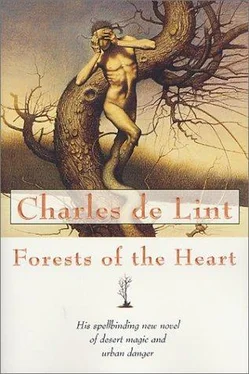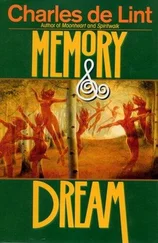The loss tore a hole in her heart that she could not imagine filling again, a bottomless shaft that seemed to put a lie to everything that was good—kindness, hope, love—leaving only an unfamiliar despair.
She couldn’t sleep for the rest of the night, hoping she was wrong, knowing she was not. All she could do was sit at the window and stare out into the rain, searching, waiting for the familiar connection to her grandmother to return. But it never did.
The next day, no one could help her. Papa had gone off into the desert with his peyoteros as soon as the family had returned from Nogales and everyone else appeared to have an enchantment clinging to them, an onion-skin layer of false memories, thin but impenetrable, that left her frustrated and confused. When she asked after Abuela, Mama and Adelita looked surprised, spoke of the trip she’d been planning, how she wouldn’t be returning for some time. They spoke as though this was old news, as though Abuela had left on this trip a long time ago.
Abuela’s friends were no help either. In town, in the desert, in la epoca del mito, the enchantment held true. She hitched a ride out to the Manuels with Juan Vicandi, one of Adelita’s older friends who owned a car, but Loleta and Ban seemed as surprised by her questions and offered no new answers to them. The gossips in the market, who could easily devote an hour to someone’s change of hair color, were remarkably incurious. In the desert she spent hours tracking down prickly-spined cholla spirits and the calm, slow-speaking saguaro aunts and uncles, she spoke to jackrabbits and phainopepla and Coyote Woman, and learned no more. Deep in la epoca del mito, she found Tadai one afternoon, sunning himself on a flat red rock, and he told the same tale.
It was not that Abuela had never existed, only that she had gone away, had been gone for some time now, and no one was worried or even curious. It wasn’t until Papa finally returned she was told another tale. She walked out into the desert with him the evening he came home, comforted by his presence, the smell of his cigarettes, the clasp of his hand around her own. They sat on a rock above a dry wash as she finished her story. From where they sat they could look down on the winding path the wash had taken, the bed still damp from the recent rains. They could hear quail murmuring under the palo verde and mesquite, and the breeze brought them a brief, pungent scent of javelina, here, then gone. In the west, the sunset cast a sliver of orange and pink across the lightly clouded sky.
“Esteperrito,” he said when she was done. “She said it was her pet when she was a child?”
Bettina nodded. “He was with her for years until he ran away.”
Papa grew sorrowful. “Era el payaso perro de los dioses viejos,” he said. It was the clown dog of the old gods.
Bettina grew cold. She shook her head, refusing to believe. It couldn’t be. But she remembered the stories both Abuela and Papa had told her about la Maravilla, how it returned for its master or mistress to show them the way to Mictlan, the land of the dead. Tears welled in her eyes. How had she not connected the stories with the arrival of her abuela’s childhood pet and her subsequent disappearance?
“But… but why?” she said. “Abuela wasn’t sick or… or anything…”
She couldn’t continue.
Papa laid his arm around her shoulders. “There comes a time when each and every one of us must journey on. I know this is no comfort to you now, chiquita, but it is the way of things.”
Bettina buried her face in his shoulder. For a long time, all she could do was sob. Papa held her close, stroking her hair. He murmured comforting words, but he might as well have been speaking Chinese, for all she could understand or take consolation from them. Finally she was able to sit up. She blew her nose on a crumpled tissue Papa pulled from his pocket and gave to her. Red-eyed, she stared out across the darkening desert. In the distance a coyote yipped and she knew a moment’s dark anger for it and all its canine clan.
“If she… if she is dead,” she finally said, “where is her body? Why does everyone act as if she’s only gone away on a trip somewhere?”
Papa rolled a cigarette and lit it before answering. The smoke he exhaled soon disappeared in the dark air.
“Su abuela,” he said. “Dorotea Murioz. She was never like other people. You know this. She traveled to other places, spoke to those that the rest of the world can only imagine. We know this to be true, for you and I, we walk in those same worlds. We know the spirits firsthand.”
He glanced at Bettina and she nodded.
“This is a wonderful thing to be able to do,” he went on, “but it can be dangerous as well. The spirits are, how do you say… inconstante.”
“Fickle.”
“Sí. Muy fickle. And easy to offend. Approach them with respect and they will mostly treat you well. But interfere in their business and they have no patience with you. Their anger is as legendary as their kindness.”
“What did she do to make them angry?”
Papa shrugged. “You know your abuela. She was never one to allow an injustice to go unchallenged and among the spirits—as it is with us—life is not always fair. What she did… this is not something she would speak of, any more than she would speak of her life before marrying your grandfather.”
“She told me about it yesterday.”
Papa nodded, as though that explained something. “What I do know,” he continued, “is that she aligned herself with one spirit which set her at odds with another.” He took a final puff from his cigarette and ground it out on the stone they sat upon, pocketing the butt. “It is best not to interfere in the business of spirits— your abuela told you that?”
“Sí.”
“It is a lesson she learned with more difficulty.”
They sat for a time in silence, watching the last of the light leak from the western sky.
“So for that,” Bettina said finally. “They just took her away?”
“That,” Papa replied. “It is such a small word and can hold so much. Who can tell what enemies she made by interfering in their business? What bargain she struck that she might come safely away once more? Caras vemos, coazones no sabemos.”
Bettina sighed. It was true. One could only guess at what another was thinking or feeling. It was impossible to know.
“I miss her,” she said.
Papa put his arm around her again. “Sí,” he told her. “I know you do.”
“Is there nothing we can do to help her?”
He shook his head. “We must abide by her decision. She went of her own choice? No one forced her?”
“She only followed the little dog, out into the storm.”
“Then we have no choice but to respect her choice.”
“And mourn.”
He nodded. “And mourn. But surely, chiquita, with all you have seen and done, you know that departing this life is but the beginning of a new journey.”
“But not for us. Not for those who are left behind.”
“It seems very final now,” he agreed. “Now you must mourn. Light a candle for her and pray for her soul.”
It was with great effort that Bettina didn’t begin to weep again. She was afraid that if she did this time, she might never stop.
“What—what will we tell the others?” she finally managed to ask.
“Nothing. Whether the enchantment is one she left behind, or that of the spirits, who are we to interfere with it?”
“But why are we untouched by it?”
“You were closer to her than any other,” he said. “Some things not even enchantment can take away.”
Читать дальше












